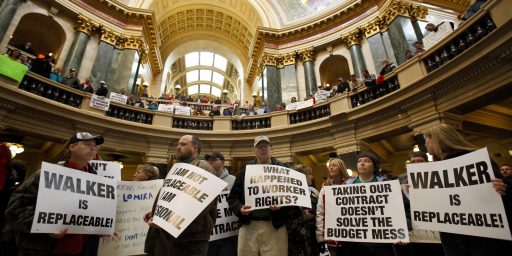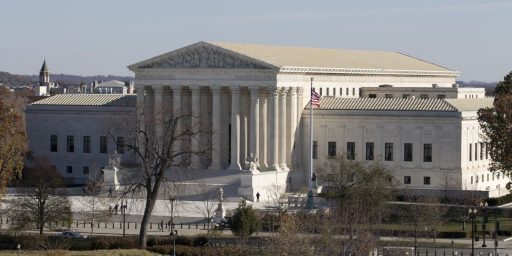Public Siding With Public Employee Unions
Two new polls seem to suggest that public employee unions are winning the public relations war that has erupted since the standoff in Madison, Wisconsin began.
First, a new CBS/New York Times poll hows a majority of those polled backing unions ability to collectively bargain with the government:
As labor battles erupt in state capitals around the nation, a majority of Americans say they oppose efforts to weaken the collective bargaining rights of public employee unions and are also against cutting the pay or benefits of public workers to reduce state budget deficits, according to the latest New York Times/CBS News poll.
Labor unions are not exactly popular, though: A third of those surveyed viewed them favorably, a quarter viewed them unfavorably, and the rest said they were either undecided or had not heard enough about them. But the nationwide poll found that embattled public employee unions have the support of most Americans — and most independents — as they fight the efforts of newly elected Republican governors in Wisconsin and Ohio to weaken their bargaining powers, and the attempts of governors from both parties to cut their pay or benefits.
Americans oppose weakening the bargaining rights of public employee unions by a margin of nearly two to one: 60 percent to 33 percent. While a slim majority of Republicans favored taking away some bargaining rights, they were outnumbered by large majorities of Democrats and independents who said they opposed weakening them.
Those surveyed said they opposed, 56 percent to 37 percent, cutting the pay or benefits of public employees to reduce deficits, breaking down along similar party lines. A majority of respondents who have no union members living in their households opposed both cuts in pay or benefits and taking away the collective bargaining rights of public employees.
Governors in both parties have been making the case that public workers are either overpaid or have overly generous health and pension benefits. But 61 percent of those polled — including just over half of Republicans — said they thought the salaries and benefits of most public employees were either “about right” or “too low” for the work they do.
When it came to one of the most debated, and expensive, benefits that many government workers enjoy but private sector workers do not — the ability to retire early, and begin collecting pension checks — Americans were closely divided. Forty-nine percent said police officers and firefighters should be able to retire and begin receiving pension checks even if they are in their 40s or 50s; 44 percent said they should have to be older. There was a similar divide on whether teachers should be able to retire and draw pensions before they are 65.
Additionally, in a new Pew Poll that focuses specifically on the controversy in Wisconsin, a plurality supports the unions over Governor Walker:
By a modest margin, more say they back Wisconsin’s public employee unions rather than the state’s governor in their continuing dispute over collective bargaining rights. Roughly four-in-ten (42%) say they side more with the public employee unions, while 31% say they side more with the governor, Scott Walker, according to the latest Pew Research Center survey, conducted Feb. 24-27 among 1,009 adults.
Take it for what you will.







So, the majority is wrong ;-). It happens from time to time.
Dual representation, or representation from two paths, is not productive for us taxpayers.
Maybe a majority just don’t understand that public employee unions both work to elect their bosses, and then negotiate “against” the same bosses to whom they send campaign checks.
Let me ask supporters of public employee union one question:
If you had to lose one or the other, what would it be? Would you accept unions bared from political contributions? Or would you prefer employee associations which can contribute politically, but cannot collectively bargain?
Don’t tell me you really demand both. No one else gets that.
I get why Republicans are doing this, becuase they think that the political optics are that unions are pro-Democrats so independents and Republicans will rally. But I think that they are completely missing the fact that whatever you might think, these are middle class workers that they are raging against. You can disagree with unions having accumulated too much power and at the same time wonder why Republicans would rather pick a fight with teachers making $50k rather than a banker making $5m when trying to solve their budget shortfalls.
Scott Walker is becoming to Obama what Newt Gingrich was to Clinton: the perfect political pinata.
What B.S….these are agenda polls…but of course you accept them with no scrutiny. Typical.
As with all polls, the outcomes depend on how you ask the question.
Would you accept corporations barred from political contributions? Or would you prefer corporations which can contribute politically, but cannot lobby politicians?
AIP, I’d be happy to bar corporations from contributing to anyone in their food chain. Sure. We could make that uniform for corps and unions.
(In fact, hell yes, let’s stop ethanol lobbying by Arthur Daniel Midlands!)
(BTW, your two items AIP, were really the same. Lobbying and contributing. I closed the gap for you by making it Lobbying/Contributing and “negotiating income from.”)
JP — Okay, you go first. Take away the political power of corporations and I’ll give on the political power of unionized employees. Until that time, I refuse your reasonable choice of cutting off either my right arm or my left foot.
“you go first’
Childish and stupid, a daily double.
The two are not linked in any other way than that they are both wrongs at the same time.
Maybe we should right no wrongs, because wrongs still exist!
BTW, the fact that descend to such arguments really tells us something about the level of discourse (and thought behind it).
We’ve left whether this dual influence is a bad thing, we’ve moved on to reasons not to fix it, anyway.
You’d really have to be immersed in the Internet cocoon actually to believe such nonsensical polling data (especially given the obvious, underlying agendas of the sources). The irony of that, of course, is that those immersed in the Internet cocoon won’t be able even to grasp the irony.
Rush just mentioned this data from the poll cited in the article:
“Of those surveyed, 20 percent said there was a union member in their household, and 25 percent said there was a public employee in their household.”
Union members comprise 12% of the population. How is it possible to get 20% of the surveyed respondents to be union members? And the idea that a random survey would get 25% that have a public employee in the household is unbelievable.
JP — What’s “childish” is to demand that middle class working people give up the only political muscle they have while the power of corporations has just increased exponentially thanks to one of the worst, and most anti-freedom, supreme court decisions since Dred Scott.
Of course political contributions by labor and political contributions by corporations are “linked” — they are both means to influence the policy decisions of the government in one way or another.
Jwest : Hey buddy I know that the concepts of weighting in a survey is sure tough but I think just maybe if you could be bothered to read a little you might understand that you’re attack is full of shit… naw you’d rather just lie and distort the poll for your agenda…
@jwest:
Well, there’s difference between 20% of the surveyed respondents being union members and 20% of the surveyed respondents saying that there was a union member in their household. I hope that you’re able to spot it.
Matt — You’re being unfair to jwest. He’s not lieing and distorting for his agenda. He’s lieing and distorting for the agendas of billionaires.
“Maybe a majority just don’t understand that public employee unions both work to elect their bosses, and then negotiate “against” the same bosses to whom they send campaign checks.”
Maybe the rightwingers just don’t understand that private corporations both fund the election of their preferred candidates, and then negotiate “against” the same pols to whom they send campaign checks, for government contracts.
I think the left need a new bogeyman besides “corporations”.
And here’s the link that was disappeared after I hit ‘submit’.
http://www.opensecrets.org/orgs/list.php?order=A
wr, when right extremists make the “he did it too” defence, don’t we laugh at them?
It is a similarly sloppy argument to say that since the middle class in general is put-upon, this subset should have double representation. It hardly solves the general problem, and risks abuse.
Read further Tano and for yuks, google how many times I’ve been called a liberal in these pages.
The problem with discussions about limited either Union or Corporate political speech is that pesky First Amendment.
Like so many other aspects of American life, we have the choice of either acknowledging the difficult contradiction at the heart of this issue: that money (via lobbying and political support) does often influence policy, but that the right to spend such money (by union and corporation alike) is a fundamentally protected right.
The only way around this is to change our current interpretations of organizations as “quasi-people/individuals.” However, should we choose to do that, then I think it’s difficult to argue that Unions should have their rights as “persons” (and granted I know it’s different than “true” corporate personhood) revoked and corporations and other organizations should not.
You can’t allow for one restriction without the other. And both would, at least for the moment, violate the first amendment.
I am sorry, but I have my doubts about all this..Ed Morrisey at Hot Air made the following points:
First, the partisan split in the sample gave a ten-point advantage to Democrats. Their sample for this poll had a D/R/I split of 36/26/31, an absurd sample for political polling. In December, Rasmussen’s general-population survey put Republicans ahead, 36.0% to 34.7% for Democrats. A recent poll by Gallup shows erosion in Democratic affiliation all through 2010. In 2008, Barack Obama won the popular vote by seven points nationwide, and the NYT/CBS poll assumes that the electorate has grown more Democratic in 2011.
Next, 20% of the poll’s respondents claim to come from union households. However, only 11.9% of American workers belong to a union, according to a report published by the Bureau of Labor Statistics last month and noted by none other than the Times itself. Union membership fell to a 70-year low as a percentage of the workforce, which in itself is a rather damning statement about the view of collective bargaining by the vast majority of American workers. How exactly did the survey manage to comprise itself of almost twice as many union-household respondents for a poll on union policies as union members in the workforce? Interesting.
Finally, 25% of respondents are either public employees or share a household with a public employee. Federal employees comprise less than 2% of the workforce at around 2 million. Overall, the US has 22.22 million government employees out of an employed workforce of 130.27 million, according to the Current Employment Statistics survey at the BLS. Government employment accounts for 17% of all workers, so a sample consisting of 25% public-sector households for a survey of adults (not registered voters) seems a little off.
The gaps in the results are wide enough that these issues by themselves might not have swung them to the opposite. However, at least the magnitude of the results can certainly be questioned in a poll this flawed.
And it is interesting to me that the same Democrats who shoved Obamacare down our throats are suddenly all about the public getting what the public wants. Well guess what, the same public reported in several different polls that they would rather see the country the default than raise its debt limit..and the same public does not want higher taxes either, nor do they want cuts in entitlements or education..so maybe people like Walker just need to do what they feel they were elected to do and let the public makes its determination next election, rather than in some poll.
wr says:
Tuesday, March 1, 2011 at 12:29
JP — What’s “childish” is to demand that middle class working people give up the only political muscle they have while the power of corporations has just increased exponentially thanks to one of the worst, and most anti-freedom, supreme court decisions since Dred Scott.
Of course political contributions by labor and political contributions by corporations are “linked” — they are both means to influence the policy decisions of the government in one way or another.
What about the middle class families that pay the taxes? They are not represented in these negotiations..on one side of the table there are the unions, on the other side of the table are the politicians they give money to…the people who actually pick up the tab are not represented. That is the problem. The people of Wisconsin voted Walker in to do a job, if they don’t like it, then they can bring back the Democrats and the Democrats can finish bankrupting the states..of course they can also increase taxes on all those horrid evil corporations who employee people and then when the debt and the unemployment rate continue to go up they just can to Barack for a handout.
Terrye, this is not a solution for “the middle class.”
Logic fail. This is a benefit for a specially favored subset.
Terrye, this is not a solution for “the middle class.”
Logic fail. This is a benefit for a specially favored subset.
Yes, I agree. I never said it was a solution for the middle class. In fact I said the opposite…I was just responding to wr who seems to think that the only socalled middle class people in Wisconsin work for the government. The bottom line is the state does not have the money to pay for this and these people are bending over backwards to ignore that. If you did a poll and ask people if the government should cut the budget or raise taxes, people would overwhelmingly say cut the budget..they just get murky on the details. The problem is that people like Walker have to deal with those details.
And btw, federal workers have fewer rights today, right now, than the public workers in Wisconsin would have if Walker’s budget passed. So maybe all these unions need to go picket DC.
I believe it’s a good thing that union bargaining rights are taken away from workers. First of all they get paid way to much money for such little work that they put out. They are spoiled people that get to retire early with hefty pensions and health plans. These people sit on their asses all day especially cops and public workers and teachers that do nothing good for society. All they want is a luxurious lifestyle and retire at an early age. I’m happy that their being stripped of thier bargaing rights. I also think that unions shuold be abolished completely!
Many of those on the right need a new bogeyman besides “unions”, particularly “public-sector unions”, as the above comments make abundantly clear…
Sorry Terrye, I did not really parse the italics as quotes! Getting things done before a camping trip (death valley, no computer, have fun all).
Terrye — As a taxpayer, do you feel you should have the right to set the pay scale for public school teachers? How will you go about doing that? Will you decide that since you pay taxes, all teachers should be paid less than you? And how about other government employees? I know that the highest paid government employee was (at one point — don’t know if this is still valid) a neurosurgeon who worked at a university hospital. Should he make thirty percent less than you do simply because your taxes are paying his salary?
Or maybe they should all be forced to work for minimum wage, thus saving you more money.
Tell me, when you buy a box of Wheaties, do you feel that gives you the right to set the salaries of everyone involved in its production and distribution?
Quinnipiac has a new poll out today that has the exact opposite results.
From the poll:
American voters are split as 46 percent say it would be a good thing and 44 percent say it would be a bad thing if the U.S. government shut down because of disagreement in Washington over federal spending, according to a Quinnipiac University poll released today.
Looking at the controversy over pay for government workers, 35 percent say the pay is “about right,” while 15 percent say it is too little and 42 percent say it is too much.
To reduce state budget deficits, collective bargaining for public employees should be limited, 45 percent of American voters tell the independent Quinnipiac (KWIN-uh-pe-ack) University poll, while 42 percent oppose limits on collective bargaining. But voters say 63 – 31 percent that government workers should pay more for benefits and retirement programs.
Efforts by governors to limit collective bargaining rights are motivated by a desire to reduce government costs rather than to weaken unions, voters say 47 – 41 percent.
Now all of these polls claim to have a small margin of error. hmmm.
wr:
Oh come, as a taxpayer I have to pick up the tab that is why. As for who is setting their pay…why do they have the right to have some politician they gave money to setting their salary?
The idea that they are special and they can break the budget, bankrupt the state, do whatever they like and everyone else just has to tolerate it is childish. These people are having a tantrum and if they don’t like the rules, they can quit and do something else.
Not as childish as this ridiculous idea that you are projecting about them…
I can’t believe how ignorant some of these comments are… You want unions to give up ability to contribute to political campaigns… then
BAN CORPORATIONS FROM CONTRIBUTING INSTEAD OF ALLOWING THEM UNLIMITED CONTRIBUTION.
If you stop corps from being contributors, then I’m sure we would be glad to stop unions from doing so as well.
If you want to do the RIGHT THING, Help out the MAJORITY of AMERICANS by TAXING THE RICH and STOPPING CORPORATE WELFARE. People and corps who make money from our economic climate should pay their fair share to the system that made it possible.
OR, if they would rather not pay taxes, PAY THE WORKERS MORE so that we can pay the damn taxes… so sick of these greedy war mongering divisionists…
-Republicans, Democrats and Independents tend to agree on some groups related to their power and influence in Washington and disagree about others. Over 80% of all three believe that big business and PACs have too much power and influence. Furthermore, similar numbers of Republicans and Democrats believe TV and radio talk shows (60% and 64% respectively) have too much power and influence.
80%…. now if we would just stop fighting each other like we are being convinced to do… we could make real change on things that matter to everyone.
Large majorities also believe that political lobbyists (81%) and the news media (75%) have too much power. Rounding out the top five are entertainment and sports celebrities, as over two-thirds (70%) of Americans believe they have too much power and influence in D.C.
Fully 90% of Americans believe that small business has too little power and influence. Large majorities also believe public opinion (76%) and nonprofit organizations (7%) have too little power and influence.-
I don’t understand why government workers have unions anyway. If they want a raise it should be up to taxpayers to grant it through referendum. Corporations don’t vote… If Senator and Representative salaries were also granted through referendum, maybe the bureaucrats would start listening to the people.